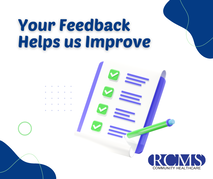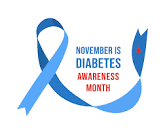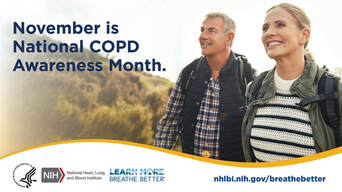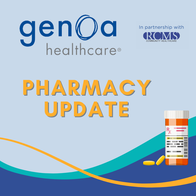RCMS News and Events
|
Stay Connected with RCMS
Scroll down to see the latest updates and click the button below to subscribe to The Pulse to get regular updates from RCMS directly to your email inbox. |
|
Stay Connected with RCMS
Scroll down to see the latest updates and click the button below to subscribe to The Pulse to get regular updates from RCMS directly to your email inbox. |
 Thursday, November 16 was National Rural Health Day. MHA hosted an event where our rural health care heroes were recognized by California State Assemblymember Jim Wood. Mendocino County Supervisor Ted Williams also was in attendance. Jim Wood presented a certificate of recognition to the following community members. Congratulations to RCMS and our 8 team members. RCMS:
CLSD:
MHA:
 We send surveys to our patients to get their feedback on our service. The feedback helps us know what we are doing right and where we can get better. The results of the survey are used by our performance improvement and quality improvement teams and are actively used to improve our delivery and provide you with the best possible service. Here are some excerpts from our recent survey responses: "Your whole crew here are very good." "I live in the Bay Area. I was visiting Gualala. Very impressed with RCMS. Fantastic medical care." "I was not told to fast before my appointment (did not expect lab work) so results are questionable." "Helpful staff. Clean quiet facility, all very respectful. So glad it's in the community!" "I get better care from RCMS than I have in my old doctor's office. I was very unhappy with my last doctor and medical office. I love RCMS and I tell everyone about you."  November is National Diabetes Month, a time when communities across the country seek to bring attention to diabetes. This year’s focus is on taking action to prevent diabetes health problems. Diabetes is a disease that occurs when your blood glucose, also called blood sugar, is too high. It affects about 37 million Americans, including adults and youth. Diabetes can damage the eyes, kidneys, nerves, and heart, and it is linked to some types of cancer. But there’s also good news: Taking charge of your health may help you prevent diabetes health problems. Tips to get started Manage your blood glucose, blood pressure, and cholesterol levels. Research shows that managing your diabetes as soon as possible after diagnosis may help prevent diabetes health problems. You can start by managing your diabetes ABCs.
Take small steps toward healthy habits. Lifestyle habits such as planning healthy meals, being physically active, getting enough sleep, and not smoking may help you manage your diabetes ABCs. You don’t have to do it all at once. Start slow and build healthier habits from there. Take your medicines on time. Remember to take your medicines even if you feel healthy. Talk with your doctor or pharmacist if you have trouble taking your medicines on time or at the correct dose. Reach or maintain a healthy weight. If you have overweight or obesity, ask your primary care provider if healthy eating, physical activity, or other weight-loss treatments may help you manage your weight. Take care of your mental health. Managing diabetes can be hard. If you feel down, sad, or overwhelmed, learn about healthy wasy to cope with stress. Consider talking to a mental health counselor or joining a support group. Work with your health care team. Managing diabetes takes a team. Your health care team may include a primary care provider, diabetes specialist, registered dietitian, or certified diabetes educator. Ask your primary care provider if you should talk with other health care professionals about your diabetes. Diabetes medicines, devices, and office visits can be expensive. A social worker or a member of your health care team may be able to help you find community resources or financial help for diabetes care. For more information please visit the National Institute of Diabetes and Digestive and Kidney Disease.  The National Organization of State Offices of Rural Health (NOSORH) sets aside the third Thursday of every November to celebrate National Rural Health Day (NRHD). NRHD is an opportunity to “Celebrate the Power of Rural” by honoring the selfless, community-minded spirit that prevails in rural America. NRHD showcases the efforts of rural healthcare providers, State Offices of Rural Health and other rural stakeholders to address the unique healthcare challenges that rural citizens face today and into the future. The theme this year is Innovation in Rural Health Care Delivery – a theme that RCMS embraces today and throughout its 40+ years history. As we approach the Thanksgiving holiday weekend, we want to ensure you have the latest information on RCMS hours and services during this time.
Please note that RCMS adheres to federal guidelines and will be closed for most major federally recognized holidays, including Thanksgiving. We appreciate your understanding. Even during holidays and weekends, our Urgent Care services remain available. You can access these services by calling (707) 884-4005 between 8 am and 6 pm. Our Registered Nurse advice line is also ready to assist with any non-emergency concerns after hours. Remember, for emergencies, always dial 911. We wish you a safe and joyous holiday season!  What is COPD? COPD, or chronic obstructive pulmonary disease, is a progressive disease that makes it hard to breathe. Progressive means the disease gets worse over time. COPD can cause coughing that produces large amounts of a slimy substance called mucus, wheezing, shortness of breath, chest tightness, and other symptoms. COPD can often be prevented. Cigarette smoking is the leading cause of COPD. Most people who have COPD smoke or used to smoke. However, up to 25 percent of people with COPD never smoked. Long-term exposure to other lung irritants—such as air pollution, chemical fumes, or dusts—also may contribute to COPD. A rare genetic condition called alpha-1 antitrypsin (AAT) deficiency can also cause the disease. Causes Long-term exposure to lung irritants that damage the lungs and the airways usually is the cause of COPD. In the United States, the most common irritant that causes COPD is cigarette smoke. Pipe, cigar, and other types of tobacco smoke also can cause COPD, especially if the smoke is inhaled. Breathing in secondhand smoke, which is in the air from other people smoking; air pollution; or chemical fumes or dusts from the environment or workplace also can contribute to COPD. Rarely, a genetic condition called alpha-1 antitrypsin (AAT) may play a role in causing COPD. People who have this condition have low blood levels of AAT—a protein made in the liver. Having a low level of the AAT protein can lead to lung damage and COPD if you are exposed to smoke or other lung irritants. If you have alpha-1 antitrypsin deficiency and also smoke, COPD can worsen very quickly. Some people who have asthma can develop COPD. Asthma is a chronic lung disease that inflames and narrows the airways. Treatment usually can reverse the inflammation and narrowing that occurs in asthma. Outlook COPD is a major cause of disability, and it is the fourth leading cause of death in the United States. Currently, 16 million people are diagnosed with COPD. Many more people may have the disease and not even know it. COPD develops slowly. Symptoms often worsen over time and can limit your ability to do routine activities. Severe COPD may prevent you from doing even basic activities like walking, cooking, or taking care of yourself. Most of the time, COPD is diagnosed in middle-aged or older adults. The disease is not contagious, meaning it cannot be passed from person to person. COPD is the result of damage to the lungs from smoking cigarettes or by breathing in second-hand smoke or other lung irritants—such as air pollution, chemical fumes, or dusts. COPD has no cure yet, and doctors do not know how to reverse the damage to the lungs. However, treatments and lifestyle changes can help you feel better, stay more active, and slow the progress of the disease. Prevent Complications and Slow the Progression of COPD If you have COPD, the most important step you can take is to quit smoking. Quitting can help prevent complications and slow the progression of the disease. You also should avoid exposure to the lung irritants mentioned above. Follow your treatments for COPD exactly as your doctor prescribes. They can help you breathe easier, stay more active, and avoid or manage severe symptoms. Talk with your doctor about whether and when you should get flu, or influenza, and pneumonia vaccines. These vaccines can lower your chances of getting these illnesses, which are major health risks for people who have COPD. For more information visit the National Heart, Lung and Blood Institute.
 It has been about 6 weeks since the Genoa Pharmacy opened here in Gualala in the Sea Watch Building across the street from RCMS Gualala Clinic. It is time to provide some updates to the community. This Pharmacy was built from the ground up, and had to open its doors before we were allowed to apply for some of the licenses and contracts required by law. As such, these first weeks were spent getting in place the needed contracts with Medicare and other private insurance companies so that we can serve their members. We are still working on getting the MediCal contract finalized. These requirements were beyond our control in that we had to work through Government Agencies. We also had to purchase prescription medications from wholesalers who could come to Gualala only once or twice each week due of the remoteness of our location. Additionally, it has been difficult to recruit the necessary pharmacy staff in the face of a limited candidate pool, housing difficulties, etc. These issues have slowed down operational goals for our pharmacy somewhat. We held a COVID vaccination clinic recently – but encountered significant difficulties in getting real-time insurance approvals. But, we are beginning to get over the bumps in the road:
We appreciate your patience and understanding as we go through this process. |
News & EventsLatest news and information on upcoming events at RCMS Archives
July 2024
Categories |